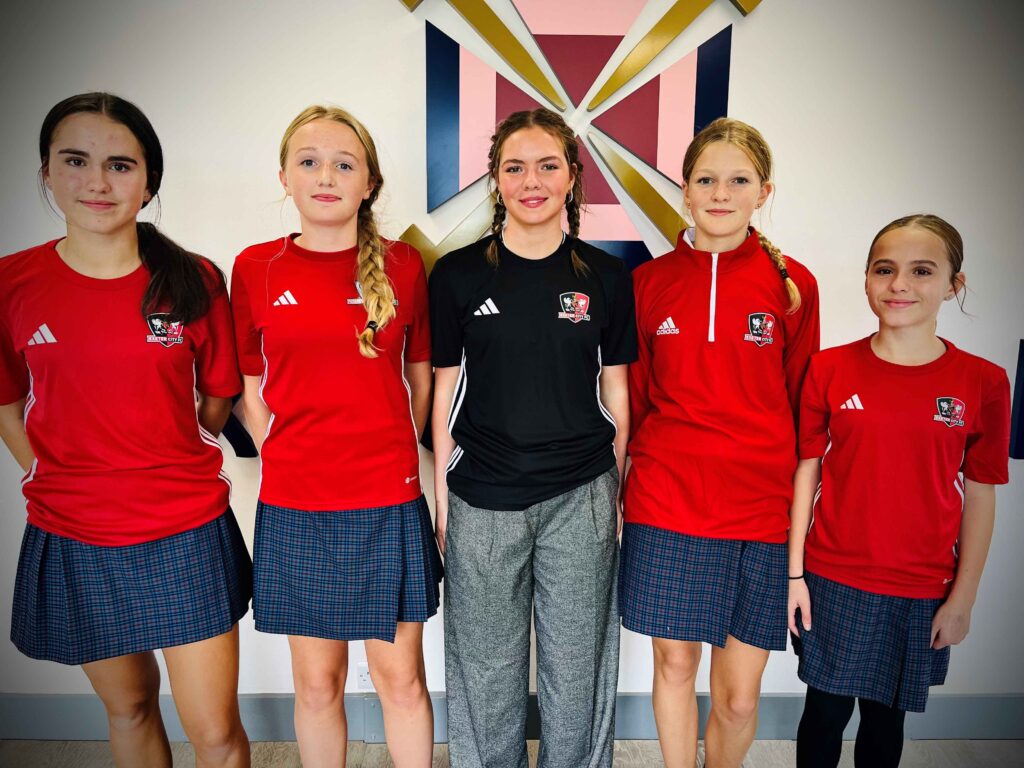Our female footballers are excelling in their achievements outside of school with five of our pupils representing Exeter City. Jess (Upper Sixth), who became the first female pupil to represent the school 1st XI last year, continues as a member of the Exeter City Women’s team this season and will be hoping to add to her debut cap last season in the FA women’s national league south. Sophie (Middle Fifth) has started her season well for the Exeter City U16 junior premier league squad whilst Faith & Anna (L5) have been selected for the U14s and Astrid the U13 GDC. All five are fantastic female role models and we look forward to celebrating their successes in the future.
The inexorable rise of girls’ sport
Despite the extensive history of Exeter School, the introduction of girls occurred relatively recently with the school’s transition to a fully co-educational establishment in September 1997.
Therefore competitive girls sport is a rather new addition to the school. Historically, it can be perceived that there was less initial focus on girls’ participation. However as of recent years we are
seeing more impressive sporting accolades from an increasing number of girls who are consistently breaking barriers and going further than seen before.
Why is this so important?
Sport and physical exercise is vital in everyday life as it acts as an outlet from the pressures of academic work and other commitments. It empowers girls to try new things and push themselves out of their comfort zones. By a certain age girls can often tend to lose interest and stop participating in organised sport, which is presented by the ‘Women in Sports’ website which states that “43% of girls who once considered themselves ‘sporty’ drop out of sport after primary school’ and “68% of girls say a fear of feeling judged by others is a barrier to doing sport”. So by continuing to advertise and empower through exercise, team and individual sports there is hope to keep girls involved for longer. At Exeter School, we value the importance of keeping young girls active and through watching older girls succeed we hope to inspire the next generations to continue to participate socially or competitively even at the elite level.
Current success
In an interview with Jess Cockayne, a Lower Sixth pupil and female footballer for Exeter City, she reflects on the importance of breaking barriers and competing in a male dominated sport at school, hoping to inspire and encourage others to do the same. Jess has progressed steadily through the Exeter City academy ranks, climbing to the U16 level before landing a spot on the Exeter City women’s reserves team. Recently, she’s been training alongside the Exeter City women’s first team, a testament to her dedication and talent. As well as performing at an elite level outside of school she became the first ever female footballer to represent the first team for school. She emphasised the significance of this milestone, particularly within a school culture that traditionally focuses on female sports like netball and hockey. “It’s nerve-racking,” she admits, “but being the first female representative in a school that doesn’t typically prioritise football is quite
thrilling.”
When prompted about encouraging younger girls to join sports, especially in a predominantly male-oriented environment, Jess stressed the need for greater visibility and encouragement. “I hope for more publicity and opportunities around smaller sports, more clubs, and not taking things too seriously,” she remarked. Her advice to aspiring young athletes? “Just try! Even if you’re scared, give it a go. Try different things.”
However, Jess acknowledges the challenges she’s encountered while playing alongside boys. “Having confidence issues, trusting your capabilities and your skillset – just because you’re not necessarily as strong or fast doesn’t mean you’re less skilled,” she asserts. Breaking stereotypes and proving oneself becomes an ongoing journey, especially in an environment where perceptions about gender in sports may prevail.
Past Exonian success
As well as current success, past Exonian success is also imperative to recognise. As arguably the most accomplished female old sporting Exonian, Emma Corney, who left the school after completing her A Levels in 2022, progressed into the early stages of her professional cricketing career, with her current team Western Storm. To an onlooker, one may simply see her undeniable talent and dedication to achieve such an impressive accolade at her early age. However, to delve deeper into the behind the scenes work that went into her success, it formulates a clear idea of the nature of an Exonian.
Throughout her schooling career Emma consistently played in the boys’ A teams and then ultimately the first cricket team; not only this but in her final season she captained the team, becoming the first ever female first team cricket captain of what is often seen by previous generations as the ‘boys’ team’. To be put into a position of authority over your peers is daunting at the best of times but to do so in such a competitive and male-dominated environment speaks volumes to the strength of her character. However, not only did she go on to achieve greatness on the pitch, she also showed excellence academically with three As at A Level. As we hope to continue to watch Emma progress on her professional journey, she becomes a role model for all girls within the school, a key figure of success both on and off the pitch, a true example of what it means to be an Exonian.
What it means to be a sporting Exonian
In essence, what it means to be a sporting success as an Exonian, whether it may be competitively or socially, is sacrifice, hard work and dedication in all aspects of life. It doesn’t only mean excelling on the pitch – or in your activity of choice – but in your school work, playing an instrument or in the drama studio… To be an Exonian is no one size fits all policy but what is clear is that, by pushing yourself out of your comfort zone, you can achieve great things!








